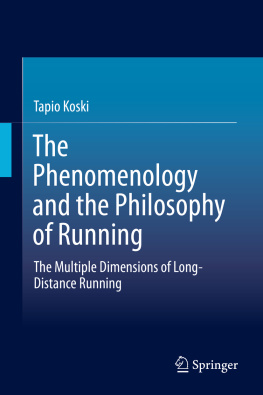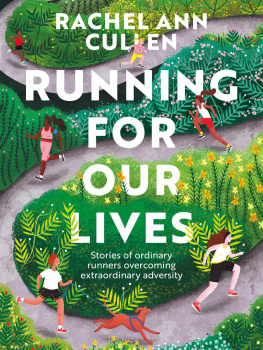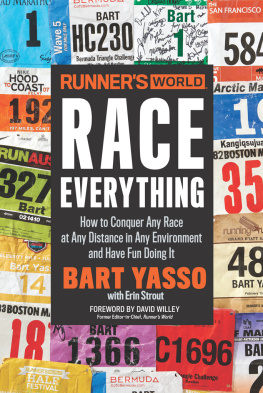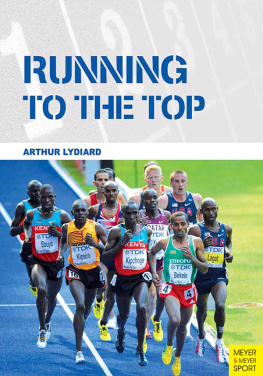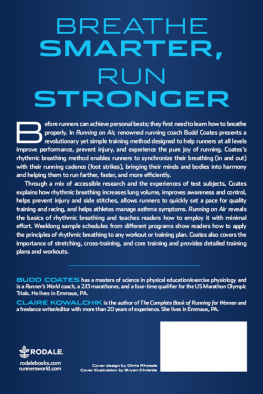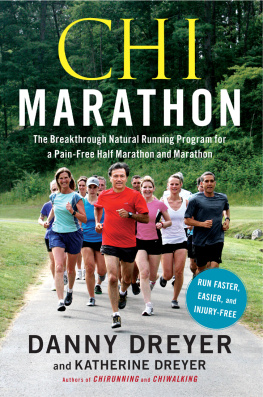1. Introduction
When I started to run , the sun was high up in the sky .
I ran for one hour , two hours .
At four o clock there was a traffic jam , and a moment later it was gone .
The sun has already moved a long way in three hours and I just keep on running .
The light is turning reddish and the sun is not as warm as it was at the beginning .
Running exists .
The landscape is a scene in which I as a runner remain unchanged .
The landscape is temporal , and the time seems to have stopped .
Physical exercise has in highly industrialized countries with a high standard of living a very different relationship to an individual and ones awareness than before. As an activity running is not dependent on technology. Ones own body and a terrain suitable for running suffice. This may initiate the experience of the autonomy and freedom of ones actions. Unless you deliberately want to use your body and muscular strength, you choose an instrument that suits the purpose. Today, taking a physical exercise or a sports activity is a conscious choice. The conscious choice to take an exercise means challenging your bodily self. The goals of the challenge naturally depend on your motivation. For example, climbing the stairs to the fifth floor calls for a deliberate choice to walk up instead of taking the lift. It calls for entertaining the possibility to see yourself as someone climbing the stairs instead. The degree of difficulty in realizing the challenge determines its nature. It means challenging oneself in relation to an achievable goal. The starting point is the idea that you can challenge your bodily and mental self through the flesh. Challenging yourself through the flesh is a conscious choice to be a sportive (mobile?) person. The conscious choice to take an exercise means challenging your bodily self.
This book deals with running and philosophy. Someone may ask the question what does running have to do with philosophy, what is philosophy needed for? Running involves running, a concrete physical and sweaty activity, rhythmic breathing, gasping whereas philosophy is about philosophy and thinking, a somewhat secondary activity compared to running. One does not learn to run by reading books. Rather, one learns by running only. However, we must bear in mind that a human being is (also) a thinking creature who by thinking is capable of adjusting ones body to certain conditions and situations. A human being makes a conscious decision when and how long to run, what factors need to be taken into account in order to make the activity to best benefit and suit oneself. Each and every running experience increases our understanding about the former exercises. The increased understanding also affects the way we understand the subsequent exercise. A runner will notice the changes in her health and well-being inflicted by running. In short, running affects both ones body and ones mind.
When running or performing some exercise, a human is in a different relationship to the world compared to ones everyday activities. While in motion, the runner will face herself one on one in a sense. When running becomes important to you, you may raise the question about its nature and significance to your physical and mental health, hence your life as a whole. A runner may end up experiencing running as a positive activity and become curious to know, for example, what happened during the latest exercise when the feeling was light and euphoric and everything happened as if by itself, at ease and so naturally. Where did the experience of delight come from, without any obvious reason? And when such an experience continues after the exercise, you may easily come to ask the question what this experience means to your life and your running. At that point we are already quite far in the philosophical pondering. This is philosophy regardless whether one thinks of it as such or not. One exercises philosophy even when denying it as useless for humans!
Running is a bodily-mental event in the corporeal world in which a runner goes through and takes a grip on an experience individually, yet partially in a way that is specific to humans, and thus common to all people. It is this common part that I wish to explore. What are these experiences that are common to all, and what is it that is so important and significant in them?
I will discuss the nature of the experiences evoked by long-distance running, how they occur and how to conceptualize and express them. Many of the experiences can be expressed with everyday language, even though they or their nature often remain unconscious. Philosophers have not investigated those hidden experiential levels (except for a few), neither have they been studied in relation to the analysis of human existence. One of those is the aforementioned experience of delight, which is apparently familiar to those who have been running long distances. Those who do not run themselves may think that this is a result from the runners personality, from the fact that she is a joyful person. Such experiences are probably shared amongst runners. Those who do not run are not, however, involved in those discussions, leaving this aspect or dimension unknown to them, which means that their understanding about running remains quite thin. What I mean to say is that you may gain your own experiences about running only by running, or else your relationship to running is formed by conceptual means only. J.P. Roos, a Finnish scholar and runner, writes about the thin understanding in his Internet book Marathon man s life as follows:
In his travel book America the French novelist Jean Baudrillard handles running as one of the central features of being American. For him running is an entirely inconceivable new form of masochism, suicidal behaviour, pursuit of death, volunteer slavery, and even infidelity. Mouth dribbling, eyes empty and focused on ones own internal countdown, runners represent to Baudrillard the degradation of human species, an apocalyptic atmosphere. Slightly similar tones can be identified in Antti Eskolas short notions on running as he expresses his aversion to joggers. I have met them both and I can rest assured that they would truly kill themselves if they started to run (as far as I know, Eskola is into some peaceful jogging these days!) The views presented by Baudrillard and Eskola are, however, interesting in the sense that they demonstrate how wrong the idea about the symbolic significances of running can be amongst outsiders. Especially the theme of suffering is entirely faulty: to the contrary, running is one of the forms of physical and mental self development and enjoyment in a modern society, not to mention easy social collaboration! Until this day I have not come across a runner with a dribbling mouth (although in winter your nose may dribble). Running is fun and enjoyable once you learn it.
A little bit later in the same chapter Roos states the following:
Running in the morning or at night both have great attractions of their own. It is an unforgettable experience to run at sunrise in a quiet town, or running on empty streets under the streetlights which make the asphalt shine. I must admit that the attraction of running does not open up in an instant. Most joggers I know complain how dull it is to run and how they actually do it against their will only because they believe they could sleep better that way, lose some weight, or the like. However, I can assure you that at some point runners will find in running the enjoyment, ease and momentum, combined with nice scenery and attractive tracks. Only someone who does not run may imagine that its monotonous, constantly the same. After all running is an extremely versatile activity that you learn first after practicing it for a long period of time.

